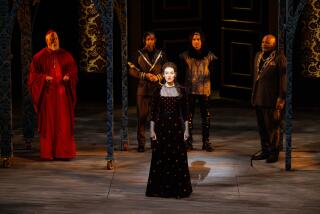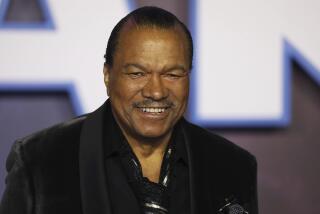Pushing the Bard beyond the page
Olivier’s Shakespeare
(Criterion, $80)
Henry V
CONSIDERED the first successful Shakespeare film, Laurence Olivier’s 1944 production is clever, engaging and beautifully staged.
Shot during the height of World War II, “Henry V,” with its monarch who overcomes extreme odds to emerge victorious, was balm for the war-weary Britons and a boost for the British troops. Though Olivier, who also stars, had never directed before -- he even asked his “Wuthering Heights” director William Wyler to helm the film -- he made “Henry V” realistic and palatable for contemporary audiences. And his approach to the film was inspired.
The opening depicts a performance of “Henry V” in front of an audience at the Globe Theater in London during Shakespeare’s time. Then Olivier takes away the stage, the audience and the props and the actors are no longer performing roles -- they have been transformed into their characters. Leslie Banks and Robert Newton are among the strong supporting cast.
Because the war made metal hard to come by, the chain mail armor used in the film was actually made from gray wool. Costumes were fashioned from scraps of cloth, and weapons were wood, painted silver. After completing the film, Olivier agreed not to do another movie for 18 months so “Henry V” could attract the largest audience possible.
The film didn’t open in the United States until 1946. It went on to receive four Academy Award nominations, including best film and actor. The Academy gave Olivier an honorary Oscar for his “artistic achievement” as actor, producer and director.
Extras: The trailer, a chronology of England’s rulers, production photos, stills galleries and instructive commentary from film historian Bruce Eder, who discusses why previous Shakespeare adaptations for films had failed, why Olivier’s approach worked and how the casting was done.
*
Hamlet
For his next Shakespeare-on-film project, Olivier chose one of the bard’s most popular plays. His 1948 version of the tragedy of the Melancholy Dane won four Academy Awards, including best picture -- the first time a foreign production had won the honor -- and best actor for Olivier. He was also nominated for an Oscar for best director but lost to John Huston for “The Treasure of the Sierra Madre.”
Though a bit long in the tooth for the role of Hamlet, Olivier is mesmerizing in this classic tale of murder, revenge and madness. Beautifully shot in black-and-white by Desmond Dickinson, the film also stars Peter Cushing, Stanley Holloway, Basil Sydney, Eileen Herlie and Jean Simmons, who received an Oscar nomination for her Ophelia.
*
Richard III
Olivier gives one of his most masterly performances -- he received an Oscar nomination -- as the Machiavellian Richard in this beautifully crafted 1955 film, which he also directed. With his pageboy hairdo, big nose, limp and massive hump, Olivier’s Richard manipulates, charms and murders his way to the English throne. Olivier based his Richard on a despised theater producer, Jed Harris (who was also the inspiration for the Big Bad Wolf in Disney’s “Three Little Pigs” short).
Shot in Technicolor and the big-screen VistaVision format, the film also features John Gielgud, Ralph Richardson and Claire Bloom.
The film was telecast on NBC the same day it had its premiere in New York -- March 11, 1956. But theatrically in the U.S., “Richard III” didn’t show a profit, and Olivier never directed another Shakespearean play for film.
Extras: The new high-definition digital transfer features newly rediscovered footage that was excised after its original release, a revelatory 1966 BBC interview with Olivier hosted by theater critic Kenneth Tynan, a 12-minute TV trailer for the film, the trailer and informative commentary with stage director Russell Lees and John Wilders, former governor of the Royal Shakespeare Theatre.
-- Susan King
More to Read
Only good movies
Get the Indie Focus newsletter, Mark Olsen's weekly guide to the world of cinema.
You may occasionally receive promotional content from the Los Angeles Times.










